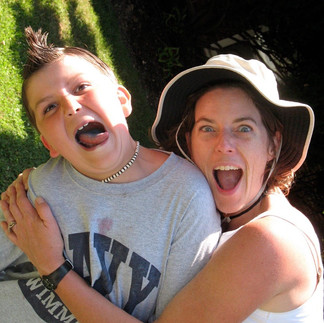Thoughts on the AIDS Epidemic as We Approach Overdose Awareness Day
- Kristin Seeberger

- Aug 29, 2023
- 4 min read
On June 8, 2020, my twenty-year-old son, James, was one of 87,000 deaths that year from an opioid overdose. His autopsy read accidental fentanyl poisoning. Let me put 87,000 in perspective: that is twice the 42,060 people who died in traffic accidents in 2020, over twice the approximately 40,000 killed in action in the Vietnam War, and 39 times the number of American service members killed in Afghanistan. It killed over 109,000 people in the U.S. in 2021. The mortality rate for opioids has surpassed that of the AIDS epidemic during its peak in the early 1990s, when there was no treatment for AIDS.
Addiction and other mental illnesses have always been viewed more as moral failings, but they are anything but. Addiction is the most tragic part of the opioid crisis, but it is not a moral failing. The failure is not being able to recognize the relationship between the disease of addiction with the socio and economic forces underpinning it today. The combination of addiction with the forces of big pharma, poverty, a prosperity-driven culture, trauma, a drug culture, and fentanyl drive the opioid epidemic and overdose deaths.
And because there is widespread misunderstanding of addiction today, we also have a crisis of compassionate understanding for those caught in the crosshairs of the opioid crisis. One compassionate act we all can do is change our vocabulary. The words we use to describe addiction and people with addiction are important: addict, user, junkie, and the phrase “needs to get clean” contribute to the stigma that creates barriers to accessing effective treatment. We don’t call someone with diabetes “dirty” we talk about their sugar levels. Let’s replace the term addiction with substance use disorder (SUD) because it matters and makes a difference.
The combination of SUD being misunderstood and the impact of an overdose on the loved one can be catastrophic emotionally, spiritually, physically, and mentally; it is an overwhelming and complicated grief, often with stigma, shame, anxiety, depression, regrets, and the never-ending soundtrack of the “what-if’s” playing as the unwelcome earworm music in our minds.
I know. Depression and deep grief consumed me for over a year before I could get outside of it and begin to chip away at understanding the forces that took my James. It was not his fault. It was not my fault. It is not a moral failing on his, mine, his brother, uncles, aunts, grandparents—and all who loved him. James and the children of the parents in the LITT group I lead—Manuel, Luke, Tommy, Matt, Gabe, Lance, Ally, Taylor, Jared, Ashley, Jordan, Max, and Nicholas—are victims of something much more significant and systemically difficult to address. Keith Humphreys, Ph.D. and professor of psychiatry and behavioral sciences at Stanford Medicine, says that our children and loved ones are “Victims of unrestrained profit-seeking and regulatory failures that instigated the opioid crisis 25 years ago, and since then, little has been done to stop it.”
The opioid epidemic is so much bigger than losing my son, but it is also just about losing my son. The loss of child to an overdose is so personal that it becomes the personification of the opioid epidemic, complete with the haunting myths and stigma
Where can I—we— turn in my grief to reduce the sigma? The answer may lie in a public health crisis that preceded the opioid epidemic by 30 years.
The AIDS epidemic combated stigma with novel approaches that focused on human rights using community advocacy and activism, creating a sense of urgency for biomedical breakthroughs and lifesaving treatments. Fast forward to today, and the global response to HIV/AIDS has attracted an unprecedented commitment of resources and international aid, and there are predictions for its end. Researchers assert that a parallel response is needed in response to the opioid epidemic.
Decades of AIDS research shows that stigma is a structural barrier that undermines people’s ability to access and engage with treatment. If responses to the opioid crisis took a comprehensive approach to stigma, they could address family, community, and societal norms, extending far beyond targeting individual attitudes. Interventions that could combat drug-related stigma include legislative change to stop the criminalization of substance use disorders; anti-stigma training workshops for churches, police, and health care providers; and social marketing campaigns that promote tolerance and combat widespread discriminatory attitudes toward people with opioid use disorder. These strategies could be assisted by engaging with affected communities in policymaking, harm reduction, and social marketing campaigns.
We all can work to eliminate the stigma of SUD and the opioid epidemic by becoming more informed, responding to the “opioid epidemic illiterate” by illuminating them with the facts, and sharing our loved ones and personal stories to combat the stigma.
Overdose Awareness Day is the world’s largest annual campaign to end overdose, remember those who have died, and acknowledge the grief of the family and friends left behind. The campaign spreads the message about the tragedy of drug overdose death and that drug overdose is preventable. The goals of International Overdose Awareness Day are:
To provide an opportunity for people to mourn loved ones publicly
To send a strong message to people who use drugs and people in recovery that they are valued
To inform people around the world about the risk of drug overdose
To provide basic information on the range of support services that are available
To prevent and reduce drug-related harm by supporting evidence-based practice
Let’s commit some of our time and resources to eliminating the stigma of SUD. On August 31, International Overdose Awareness Day, please consider letting your loved one shine beyond the crosshairs of the opioid epidemic so that we can break the stigma. This is what the AIDS activists did so well.
Changing individual attitudes gives me purpose. Changing community and societal norms gives me hope.
Ways to Share and Get Involved
International Overdose Awareness: The Australian organization started the campaign in 2001. You can post a tribute. You can also find events for your country, state, or city under the “Join An Event” button on the home page. You can follow them on Facebook or Instagram.
Sources:
Caroline, Parker M. "Facing Opioids in the Shadow of the HIV Epidemic" The New England Journal of Medicine, 2019, pp. 1-3, https://doi.org/10.1056/NEJMp1813836.
.png)









Comments